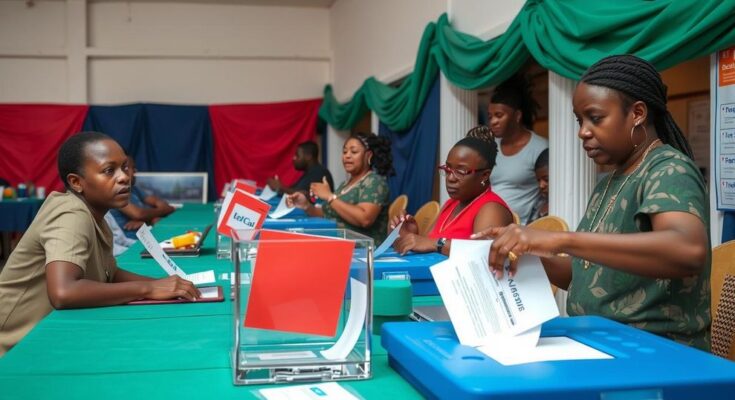Voters in Comoros are casting ballots for a new 33-seat parliament amid accusations of electoral irregularities following President Azali Assoumani’s re-election. Approximately 338,000 registered citizens are participating, with around 100 candidates contesting the elections. Opposition strategies vary, with some groups advocating for a boycott while others encourage participation to expose the ruling regime’s shortcomings. Results are anticipated by Friday.
In the Indian Ocean archipelago of Comoros, voters have gathered to participate in the election for a 33-seat parliament, following the re-election of President Azali Assoumani amidst claims of electoral fraud by the opposition. The elections, which commenced with polling stations opening early on Sunday, are contested by approximately 100 candidates endorsed by the Supreme Court. With a voting population of around 338,000 registered individuals, these elections are crucial in the political landscape of Comoros, particularly given the controversies surrounding President Assoumani’s governance and potential dynastic succession for his son, Nour El-Fath. While some opposition groups, like Juwa, have advocated for a boycott, others assert the necessity of participation to highlight the ruling regime’s flaws and accelerate its demise. Results from the elections are anticipated by Friday.
Comoros has experienced significant political turmoil since Azali Assoumani seized power in a coup in 1999. His tenure has seen him reelected multiple times, with the most recent election being criticized by opponents for not being free or fair. As Assoumani approaches the end of his term in 2029, concerns have emerged regarding his intentions for dynastic leadership, particularly with the consolidation of power granted to his son. This parliamentary election follows a two-year gap since the last elections, and amid these ongoing political tensions, the participation of various factions reveals a divided opposition.
The parliamentary elections in Comoros represent a significant moment for the nation’s political future amid allegations of electoral misconduct and authoritarianism under President Assoumani. As various opposition groups navigate their strategies, the outlook remains uncertain. The electoral process serves not only as a means for legislative representation but also as a litmus test for the current regime’s legitimacy and accountability. The results, expected shortly, will provide insight into the prevailing political dynamics and citizen sentiment within Comoros.
Original Source: www.muswellbrookchronicle.com.au




